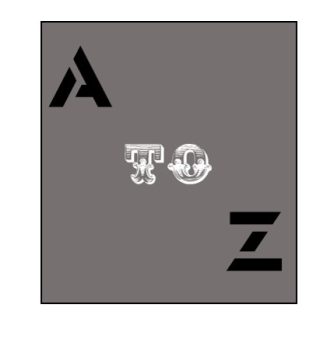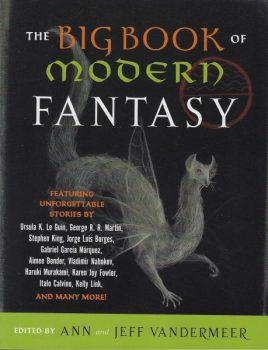A to Z Reviews: “The Spring of Dongke Temple,” by Qitongren
 Qitongren offers a mix of fantasy and fairy tale with “The Spring of Dongke Temple.” Originally published in Chinese in 2007, it was translated by Liu Jue in 2019 for publication in the anthology of Chinese science fiction Ticket to Tomorrow and Other Stories. In 2020, Ann and Jeff VanderMeer selected the story for The Big Book of Modern Fantasy.
Qitongren offers a mix of fantasy and fairy tale with “The Spring of Dongke Temple.” Originally published in Chinese in 2007, it was translated by Liu Jue in 2019 for publication in the anthology of Chinese science fiction Ticket to Tomorrow and Other Stories. In 2020, Ann and Jeff VanderMeer selected the story for The Big Book of Modern Fantasy.
“The Spring of Dongke Temple” opens with a cautionary tale of a woodsman who stumbled upon the isolated Buddhist temple in the mountains and after a brief stay there returned to his family refusing to say anything about the temple except to note the proliferation of swallows in the ruins. The brief description gives the temple a feeling that it might not be out of place in the tales of H.P. Lovecraft.

The story quickly shifts to Liu Xichu, a scholar who traveled into the mountains with several other scholars and a boatman in an attempt to find the ruins of the elusive temple. A flash flood separates Liu from his companions and he quickly gets lost in the mountains, surviving only on a bit of bread and wild berries. Eventually, Liu stumbles across the ruins.
The Dongke Temple has been abandoned by humans, but it serves as a nesting place for scores of swallows, who returned to the ruins each spring. Finding enough berries and honey to survive, Liu finds that he has no desire to leave the ruins to return to his family and comrades, eventually forgetting they exist at all. He is content to live among the abandoned stones of the temple with the occasional swallows and bats.
Eventually, he discovers that he is not as alone as he had believed. The abbot of Dongke Temple, Wushi, still resides in the ruins, living an a deep well. It is from Wushi that Liu learns that the monks left the temple as they began to care less and less about contemplating the teachings of the Buddha, a worldview to which Wushi can now subscribe as well.
“The Spring of Dongke Temple” raises questions about the purpose of contemplation. The monks of the temple may not have found enlightenment based on the teachings of Buddha, however from what Wushi tells Liu and what Liu witnesses, it seems clear that the monks of Dongke Temple have managed to find a different path to tranquility.
Wushi has also transformed during his time in the temple since the monks abandoned it, although his transformation appears to be more base in nature. At the same time, it may simply be one transformative step on his own journey to achieve the sense of serenity that the other monks have achieved, at the same time, providing Liu with a blueprint for finding his own sense of belonging, even as Liu has rejected any sense of needing to return to his family.
Qitongren turns the ironic story on its head by offering the readers a twist at the beginning of the story and then following through with a story which may be perfectly telegraphed, but works well and offers its own surprises as Liu discovers the Dongke Temple and the secrets of the fate of its inhabitants.
 Steven H Silver is a twenty-time Hugo Award nominee and was the publisher of the Hugo-nominated fanzine Argentus as well as the editor and publisher of ISFiC Press for eight years. He has also edited books for DAW, NESFA Press, and ZNB. His most recent anthology is Alternate Peace and his novel After Hastings was published in 2020. Steven has chaired the first Midwest Construction, Windycon three times, and the SFWA Nebula Conference six times. He was programming chair for Chicon 2000 and Vice Chair of Chicon 7.
Steven H Silver is a twenty-time Hugo Award nominee and was the publisher of the Hugo-nominated fanzine Argentus as well as the editor and publisher of ISFiC Press for eight years. He has also edited books for DAW, NESFA Press, and ZNB. His most recent anthology is Alternate Peace and his novel After Hastings was published in 2020. Steven has chaired the first Midwest Construction, Windycon three times, and the SFWA Nebula Conference six times. He was programming chair for Chicon 2000 and Vice Chair of Chicon 7.
🤨 I just don’t know. Part of me *really* questions the origin of this story. Not only is there the unfortunate pronunciation convergence of the temple name in the English-speaking mind (Dongke –》Donkey), but in some spellings “Qitongren” translates to “Barrel Rider.” Given (a) the parody/inversion of Buddhist tropes, and (b) the Chinese and Japanese propensity for representing westerners with cowboys, my warning bells are jangling that this is someone from the western hemisphere having a joke at everyone’s expense.
Do we know anything about the author’s track record in Chinese publication? I’m willing to cop to paranoia, but some proof would be nice.
So we English-readers only know Qi Tong Ren (recorded characters are the exact spelling that means “barrel rider” 骑桶人) from “Spring of Dongke Temple” (2010) and “The Floating Temple” (2007), both of which were short stories published in anthologies.
Three years would be a bit of a commitment for perpetrating a farce, but is not unheard of. Additionally, those were the years of translation, not necessarily the years of writing. I’m going to remain suspicious.
According to the introductory paragraph to “The Spring of Dongke Temple” in The Big Book of Modern Fantasy, “Qitongren, also known as Li Qiqing or Bucketrider, is the editor-in-chief for the inline fantasy magazine Jiuge. His work includes a short story collection, a full length novel, a historical account of ancient Chinese fantasy literature, and a biography of famous Chinese Buddhist monk Master Hong Yi.”